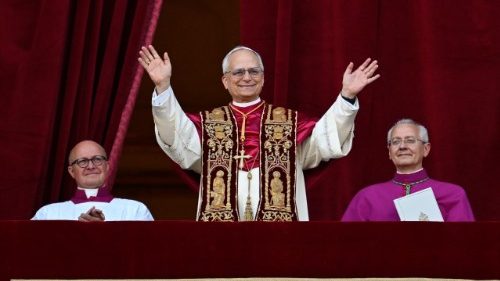
- Details
- By Levi Rickert
On the second day of the conclave to elect a new pope following the death of Pope Francis on April 21, 2025, white smoke rose from a chimney in the Vatican—signaling to the world that a new pontiff had been chosen.
Just over an hour later, Cardinal Robert Prevost, 69, a Chicago native, was introduced as the new leader of the Catholic Church. He will be known as Pope Leo XIV. He became the first pope born in the United States.
Pope Leo XIV has a long-standing history of service in Peru, particularly among Indigenous communities. Before his election, he served as a missionary, bishop, and later archbishop in the Chiclayo diocese. He is widely respected for his commitment to the poor and marginalized, including Indigenous populations.
As the head of the Catholic Church—whose global membership numbers approximately 1.4 billion—Pope Leo XIV now also shepherds the spiritual lives of around 200,000 Native American Catholics across Indian Country.
Rev. Mark Francis, a longtime friend of Cardinal Prevost since the 1970s, told Reuters that the new pope was a strong supporter of his predecessor’s papacy—particularly the late pontiff’s dedication to social justice.
Pope Leo XIV’s predecessor Pope Francis gave an apology to Canadian First Nation people during a visit to Canada in July 2022. Cardinal Prevost has acknowledged the historical context of residential schools, recognizing the harm caused to Indigenous communities. He has emphasized the importance of reconciliation and healing. His statements have also focused on the need for the Catholic Church to take responsibility for its role in the system, alongside the Canadian government.
More Stories Like This
Native News Weekly (August 25, 2024): D.C. BriefsNavajo Nation Mourns the Passing of Former Vice President Rex Lee Jim
Deb Haaland Earns Endorsement From Communications Workers of America Local 7076
University Soccer Standout Leads by Example
Two Native Americans Named to Democratic Congressional Campaign Committee's“Red to Blue” Program
Help us defend tribal sovereignty.
At Native News Online, our mission is rooted in telling the stories that strengthen sovereignty and uplift Indigenous voices — not just at year’s end, but every single day.
Because of your generosity last year, we were able to keep our reporters on the ground in tribal communities, at national gatherings and in the halls of Congress — covering the issues that matter most to Indian Country: sovereignty, culture, education, health and economic opportunity.
That support sustained us through a tough year in 2025. Now, as we look to the year ahead, we need your help right now to ensure warrior journalism remains strong — reporting that defends tribal sovereignty, amplifies Native truth, and holds power accountable.
 The stakes couldn't be higher. Your support keeps Native voices heard, Native stories told and Native sovereignty defended.
The stakes couldn't be higher. Your support keeps Native voices heard, Native stories told and Native sovereignty defended.
Stand with Warrior Journalism today.
Levi Rickert (Potawatomi), Editor & Publisher


